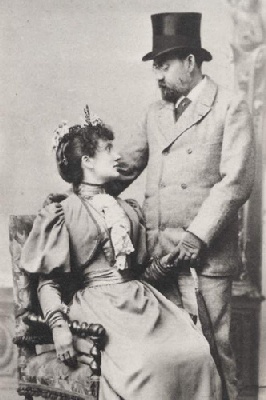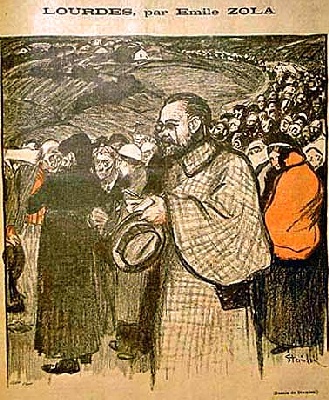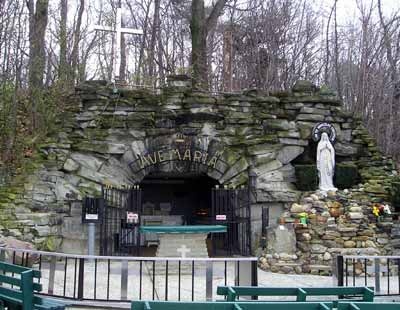Complete Works of Emile Zola (1280 page)
Read Complete Works of Emile Zola Online
Authors: Émile Zola

A burst of distant music seemed to surprise Clotilde. She turned her head and looked across the fields gilded by the oblique rays of the sun. Ah, yes! the ceremony, the laying of the corner stone yonder! Then she turned her eyes again on the child, and she gave herself up to the delight of seeing him with so fine an appetite. She had drawn forward a little bench, to raise one of her knees, resting her foot upon it, and she leaned one shoulder against the table, beside the tree and the blackened fragments of the envelopes. Her thoughts wandered away in an infinitely sweet reverie, while she felt the best part of herself, the pure milk, flowing softly, making more and more her own the dear being she had borne. The child had come, the redeemer, perhaps. The bells rang, the three wise men had set out, followed by the people, by rejoicing nature, smiling on the infant in its swaddling clothes. She, the mother, while he drank life in long draughts, was dreaming already of his future. What would he be when she should have made him tall and strong, giving herself to him entirely? A scientist, perhaps, who would reveal to the world something of the eternal truth; or a great captain, who would confer glory on his country; or, still better, one of those shepherds of the people who appease the passions and bring about the reign of justice. She saw him, in fancy, beautiful, good and powerful. Hers was the dream of every mother — the conviction that she had brought the expected Messiah into the world; and there was in this hope, in this obstinate belief, which every mother has in the certain triumph of her child, the hope which itself makes life, the belief which gives humanity the ever renewed strength to live still.
What would the child be? She looked at him, trying to discover whom he resembled. He had certainly his father’s brow and eyes, there was something noble and strong in the breadth of the head. She saw a resemblance to herself, too, in his fine mouth and his delicate chin. Then, with secret uneasiness, she sought a resemblance to the others, the terrible ancestors, all those whose names were there inscribed on the tree, unfolding its growth of hereditary leaves. Was it this one, or this, or yet this other, whom he would resemble? She grew calm, however, she could not but hope, her heart swelled with eternal hope. The faith in life which the master had implanted in her kept her brave and steadfast. What did misery, suffering and wickedness matter! Health was in universal labor, in the effort made, in the power which fecundates and which produces. The work was good when the child blessed love. Then hope bloomed anew, in spite of the open wounds, the dark picture of human shame. It was life perpetuated, tried anew, life which we can never weary of believing good, since we live it so eagerly, with all its injustice and suffering.
Clotilde had glanced involuntarily at the ancestral tree spread out beside her. Yes, the menace was there — so many crimes, so much filth, side by side with so many tears, and so much patient goodness; so extraordinary a mixture of the best and the most vile, a humanity in little, with all its defects and all its struggles. It was a question whether it would not be better that a thunderbolt should come and destroy all this corrupt and miserable ant-hill. And after so many terrible Rougons, so many vile Macquarts, still another had been born. Life did not fear to create another of them, in the brave defiance of its eternity. It continued its work, propagated itself according to its laws, indifferent to theories, marching on in its endless labor. Even at the risk of making monsters, it must of necessity create, since, in spite of all it creates, it never wearies of creating in the hope, no doubt, that the healthy and the good will one day come. Life, life, which flows like a torrent, which continues its work, beginning it over and over again, without pause, to the unknown end! life in which we bathe, life with its infinity of contrary currents, always in motion, and vast as a boundless sea!
A transport of maternal fervor thrilled Clotilde’s heart, and she smiled, seeing the little voracious mouth drinking her life. It was a prayer, an invocation, to the unknown child, as to the unknown God! To the child of the future, to the genius, perhaps, that was to be, to the Messiah that the coming century awaited, who would deliver the people from their doubt and their suffering! Since the nation was to be regenerated, had he not come for this work? He would make the experiment anew, he would raise up walls, give certainty to those who were in doubt, he would build the city of justice, where the sole law of labor would insure happiness. In troublous times prophets were to be expected — at least let him not be the Antichrist, the destroyer, the beast foretold in the Apocalypse — who would purge the earth of its wickedness, when this should become too great. And life would go on in spite of everything, only it would be necessary to wait for other myriads of years before the other unknown child, the benefactor, should appear.
But the child had drained her right breast, and, as he was growing angry, Clotilde turned him round and gave him the left. Then she began to smile, feeling the caress of his greedy little lips. At all events she herself was hope. A mother nursing, was she not the image of the world continued and saved? She bent over, she looked into his limpid eyes, which opened joyously, eager for the light. What did the child say to her that she felt her heart beat more quickly under the breast which he was draining? To what cause would he give his blood when he should be a man, strong with all the milk which he would have drunk? Perhaps he said nothing to her, perhaps he already deceived her, and yet she was so happy, so full of perfect confidence in him.
Again there was a distant burst of music. This must be the apotheosis, the moment when Grandmother Felicite, with her silver trowel, laid the first stone of the monument to the glory of the Rougons. The vast blue sky, gladdened by the Sunday festivities, rejoiced. And in the warm silence, in the solitary peace of the workroom, Clotilde smiled at the child, who was still nursing, his little arm held straight up in the air, like a signal flag of life.
THE END
The Three Cities
Les Trois villes
is a three-novel cycle written by Zola from 1893 to 1898, directly after completing the previous cycle
Les Rougon-Macquart
. The hero, the Abbé Pierre Froment, serves as a link between the three novels
Lourdes
,
Rome
and
Paris
, in which Zola examines the place of religion in modern society, as well as the confrontation between the wealthy bourgeoisie and the underprivileged poor.

Zola with his mistress Jeanne in 1893, the year the first novel in this series was published.
LOURDES

Translated by Ernest Alfred Vizetelly
The first novel in the
Les Trois villes
series is a moving depiction of a pilgrimage to Lourdes, analysing the corruption of the proclaimed ‘miracles’ at the shrine and the suffering of the poor, who desperately flock to the city for refuge from pain. Based on Zola’s own visit to the pilgrimage site, the novel follows a simple five-part structure corresponding to the five-day train trip from Paris to Lourdes and back. Zola’s narration shifts from character to character describing in detail the physical effects of their illnesses, their hopes, beliefs, fears and their unconquerable endurance. The author himself makes a brief appearance in the narrative, disguised as a sceptical reporter whose probing questions embarrass a doctor in charge of verifying the alleged miracles.

Émile Zola on his ‘pilgrimage’ of Lourdes, published in Gil Blas, April 22, 1894

The shrine at Lourdes
CONTENTS
V. THE DEATH OP BERNADETTE — THE NEW RELIGION
PREFACE
BEFORE perusing this work, it is as well that the reader should understand M. Zola’s aim in writing it, and his views — as distinct from those of his characters — upon Lourdes, its Grotto, and its cures. A short time before the book appeared M. Zola was interviewed upon the subject by his friend and biographer, Mr. Robert H. Sherard, to whom he spoke as follows:
“‘Lourdes’ came to be written by mere accident. In 1891 I happened to be travelling for my pleasure, with my wife, in the Basque country and by the Pyrenees, and being in the neighbourhood of Lourdes, included it in my tour. I spent fifteen days there, and was greatly struck by what I saw, and it then occurred to me that there was material here for just the sort of novel that I like to write — a novel in which great masses of men can be shown in motion —
un grand mouvement de foule
— a novel the subject of which stirred up my philosophical ideas.
“It was too late then to study the question, for I had visited Lourdes late in September, and so had missed seeing the best pilgrimage, which takes place in August, under the direction of the Peres de la Misericorde, of the Rue de l’Assomption in Paris — the National Pilgrimage, as it is called. These Fathers are very active, enterprising men, and have made a great success of this annual national pilgrimage. Under their direction thirty thousand pilgrims are transported to Lourdes, including over a thousand sick persons.
